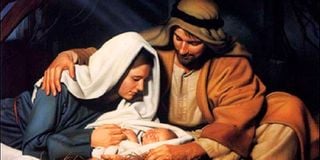There is a lot to learn from Christ’s story

Politico-economic challenges around the time of the birth of Christ were epic.
Of the four gospels, Matthew and Luke have stories about the birth of Jesus Christ, commonly known as the Infancy Narratives.
Mark is silent on the birth of the Messiah. Having stated his theme as: “the gospel of Jesus Christ, the Son of God”, he immediately proceeds to tell the story of Jesus’ public ministry, with John the Baptist serving as the forerunner.
The evangelist John does not bother with the human origins of Jesus. He traces him back to eternity: “The Word became flesh and dwelt among us”, often referred to as the Incarnation. (John. 1:14)
In his reflection on the Incarnation, St Augustine – the great African theologian and philosopher – wrote in the 4th century: “When justice looked down from heaven, truth sprang forth from the Earth” (Sermon 185).
For Augustine, often called the Doctor of Grace, the Incarnation has far-reaching implications for the manner human beings organise themselves in society and as individual persons.
Hence his use of the themes truth and justice.
In his account of the birth of Jesus Christ, Luke repeatedly states that God’s plan is to “deliver”, liberate, redeem and save” his faithful from oppressive conditions, regimes, enemies and other haters. (Luke 1:71)
Several clues in the Lucan account indicate that the redemption the saving-child brings will include not just spiritual rescue but also encompass political, economic and other forms of liberation.
Of the four evangelists, Luke has the largest number of reflections on the place of material resources, including land, built environment, wealth, riches, money in the life of human beings and their final destiny.
He gives parables touching on wealth one does not find in any other gospel: the rich fool (Luke 12:13-21, the dishonest steward (Luke 16:1-9, Dives and Lazarus (Luke. 16:19-31).
This evangelist has a special place for the poor, their dignity and empowerment.
Luke, the well-educated author, physician-turned-evangelist, has checked his sources very carefully.
This Gentile outsider who became a Christian insider noted that Jesus was born during the census ordered by Emperor Augustus. (Luke. 2:1).
We know from extra-biblical sources, notably as recorded by the respected historian Flavius Josephus in his book The Antiquities of the Jews, that this registration was in the year 6 Before the Christian Era (BCE).
According to Josephus, an individual named Judas (not Iscariot), led a revolt against Rome because the census was connected with the target to collect higher taxes.
It is clear from the clues in the gospel of Luke that the politico-economic challenges around the time of the birth of Jesus were epic.
The indigenous people of Judah-Samaria-Galilee were experiencing serious governance and economic problems.
The hopes, fears and aspirations expressed by various people in the Lucan infancy narrative, including Zachariah, Elizabeth, Simeon, Anna and Mary – the mother of Jesus – mirror a yearning for a truly new beginning.
The birth of Jesus is believed to fulfil that messianic hope.
Readings of the Christmas liturgy in many churches include Isaiah chapter 52, which speaks of the messenger of good news who is received with joy.
But even in this powerful text, the message and its bearer are different.
An epistle often read during the Christmas liturgy is Hebrews chapter 1.
In the second verse, the text states: “In these last days, God has spoken through a son”.
As in the reading from Isaiah, the message and the messenger remain distinct.
A favourite scripture reading for the liturgy during Noel is John Chapter 1, culminating in verse 14: “The word became flesh and dwelt among us.”
In this periscope, the message and the messenger are one and the same, identical.
We are celebrating Christmas against a backdrop of tough, even harsh, economic times.
While family is part and parcel of the festive season, many cannot afford fare to travel to their homes.
Bus and matatu operators have been heard to lament that their vehicles are idle because of lack of passengers.
This is to say nothing of school fees for learners come next year.
For the Christ-event to unfold, persons at the centre of the Christmas drama had to face challenges.
Perhaps there are lessons to learn from their attitude and action.
Merry Christmas!
- Fr Njoroge, Vice Postulator of the Cause of the Servant of God Maurice Cardinal Otunga, is Professor of Development Studies and Ethics at Jomo Kenyatta University of Agriculture Technology. [email protected]



